16lbs of fat loss & 2.5 months later on the potato diet
How I lost a lot of fat without much pain or time consumed
April 2025 Update
When I wrote this in October 2024, I was developing a service to help people determine their ideal diet for weight loss based on their DNA. For me, this diet worked fairly well, but for some others, it didn't work at all, and a keto diet works amazingly. I wanted to make it easy for people to figure out their easy weight loss diet, so we made a service for it called https://www.patchworkfood.com/. We have helped many people!
I’ve also maintained my fat loss since the end of the diet seven months ago, and I’m now focused on building muscle. I eat a far more flexible diet, don’t track my food and for a period, I was eating ice cream every night for months. Many people rebound after weight loss, but I haven’t!
Intro
I’ve been on the potato diet for about 2.5 months and have lost approximately 16 pounds of fat mass, with no significant loss of lean mass. I’ve been taking a monthly DEXA scan to help track my progress, and I was surprised to find that I lost only fat on the first scan. I was even more surprised when I gained back some lean mass and still lost a significant amount of fat mass on the second scan, five weeks later. Considering the slight variation of lean mass lost and gained as noise, I probably have not lost any lean mass.
Previously, I tried a high-fat keto diet for one month around June and lost 10 lbs during that month. My energy levels weren’t that great, even at the end of it, and keto induction was pretty brutal for me. On the other hand, the high-starch potato diet was the opposite, as my energy levels were better than baseline. Overall, since May 2024, I’ve lost about 30 lbs. I also dropped from a high of 1.9 lbs of visceral fat to 0.8 lbs. The other 5 lbs lost were from other small experiments in between. My DEXA scan showed 189 lbs was from my clothing, and 1 or 2 lbs of weight gain after stopping the diet for a week, which I’m not worried about. I‘ve done my last two or three DEXA scans fasted to minimize variation.
I am probably the slimmest I’ve been since I was 4 or 5 years old. Even when I was lighter, my belly had never been this small. I‘ve been doing Apple Fitness weight training for about 1.5 years, so I’m guessing I’ve gained some muscle mass over that period. Other benefits include improved mental energy, a general drop in heart rate for both resting and exercising (by ten bpm within a week), enhanced general cardio performance, and a warmer overall body temperature.
My Potato Diet Experience
If you're not familiar, the potato diet involves eating unlimited amounts of potatoes as desired, along with fat-free, low-calorie sauces and calorie-free beverages like coffee and water. I avoided artificially sweetened zero-calorie drinks for most of it. I had a lot of soy and other sauces with my potatoes, peeled the skin, and steamed them in an Instant Pot.
I’ve found it to suppress my appetite like no other diet, and I’m not craving any more food. I‘ve tried eating a lot of bread and rice, and there's something special about potatoes that stops me from craving more food or feeling hungry, along with probably other beneficial effects. This effect was particularly powerful at the beginning. I’ve written this article based on my assumptions about the diet and provided additional details.
While on the diet, I engaged in moderate strength training 1-3 times a week, ice skating with my partner twice a week, and other low to moderate-intensity activities. Most days of the potato diet, my energy was better than usual. When I started tracking my calorie intake later in the diet, I would naturally only want to eat about 1600 to 2300 calories daily.
Nutritionally, approximately 2,000 calories per day are consumed with soy sauce and coffee. You eat 411g of carbs, 47g of protein, and 2.6 g of fat. Potatoes eaten in large volumes have way more nutrition than you would think.
Mostly Potato Diet
3 to 4 weeks into the potato-only diet, I started not feeling the best and wanted to stop the diet. I guessed I wasn't feeling my best due to a lack of micronutrition. So I went into the Cronometer app and calculated the minimum of what I could eat that would cover most of my missing micronutrition, and it comes down to adding this in addition to unlimited potatoes:
🥚 3 eggs, poached in the microwave with runny yolks to have more nutrition from runny vs. hard yolks (choline and many others, 250 cal)
🫐 100-120g of frozen acai berry + 10-15g of honey or maple syrup (vitamin E + minerals and others) (120 cal)
🥕 1 large carrot (vitamin A, 50 cal)
🍙 Nori seaweed sheets (for iodine + spice) (2 cal)
💊 Methylfolate, partial zinc (23mg), selenium, and sometimes vitamin K supplements.
It contains approximately 450 calories, with most of the calories coming from the eggs and acai. I also added some bites of raw honeycomb and some small bites of dark chocolate squares. Dark chocolate was especially calorie-dense, and I chose it because a pattern had emerged where dark chocolate accelerated some potato diet experimenters’ weight loss further. It was theorized that dark chocolate's potassium and stearic acid were responsible for that. I was also trying to avoid large amounts of PUFAs in whatever I added.
I was considering adding oysters or snails for their zinc and selenium content, but found the preparation to be annoying, expensive, and difficult to find. Alternatively, canned options are available, but they are often accompanied by a vat of vegetable oil, which I wanted to avoid. I also used mung bean sprouts as a source of folate, but I quickly grew tired of them. So, I added supplements to cover the small missing parts left. I timed my zinc supplement to coincide with regular large meals, so the copper and zinc in the potatoes wouldn’t compete for absorption. I also don’t take a vitamin D supplement, as I try to generate all my vitamin D through sun exposure, which is another experiment.
If you want to replicate this diet but are concerned about eggs or other foods, replacing them with alternative options should be straightforward by experimenting with the Cronometer app. For example, you could get choline from a lecithin or alpha GPC supplement if you need to avoid cholesterol in eggs, want to be vegan, or have an egg allergy. Or find an alternative source of vitamin E if acai is difficult to obtain. You can get vitamin A and many other nutrients from a small amount of liver, red, orange vegetables, or tubers. If you don’t like runny eggs or any other preparation method, this modified diet doesn’t restrict preparation methods; it’s just how I prefer to do it myself.
My goal was to fill in the missing Recommended Daily Allowance (RDA) amounts of vitamins and minerals that I had on the potato diet. I would suggest covering most of your nutritional needs with food, if possible, because supplements can contain additives or other ingredients that may not agree with your body. I find that when I have too many supplements, it makes me feel bad, while food does not.
My Mostly Potato Diet Experience
After some very intense gym days when I wasn’t recovering well, I would sometimes have 20g of collagen peptide powder, a 30-calorie dried miso soup packet, and soy sauce in hot water. This solved my issue with not recovering well in those days, but it was specifically designed to address a persistent recovery issue that I was experiencing in my joint and tendon areas. If I felt a recovery issue in my actual muscles, I would eat more protein explicitly. I tried adding it as a daily thing, but I wasn’t craving it unless I had a recovery issue, so I only had it when I felt like it.
I continued to lose weight, and my VO2 max, as measured by Apple Health, and cardio performance improved significantly while following this diet, without engaging in any explicit cardio exercises. Walking up the hills around my house got easier quicker, and I was surprised by how quickly it came on.
In the last week of the diet, I hit a stall. My VO2 max performance flatlined on Apple Health; I wasn’t performing as well in the gym, and I was experiencing general issues with recovery. It was a bit of a mystery as to why. My guess is that I pushed too hard, possibly in the gym, and was experiencing recovery issues, or some micronutritional issue that the Cronometer app couldn’t account for, was asserting itself. Calorically, I stayed within my usual 1,800-2,400 calorie range.
Overall, I think that mainly going potato helped me stay on the diet for far longer than I would have on a full potato diet, but in the end, it wasn’t enough to keep me on it without a break.
I tried adding more protein, up to 120g/day, but I was still having issues, so I decided to stop the diet until my next scheduled blood draw. I was going to have a DEXA scan right after I stopped, but it got canceled on me, and I had to push it out a week, so for about 1 week before the scan, I was off diet, eating intuitively. My weight has stayed mostly the same since I wrote this.
My Weight Loss Method Goals
I’m starting a company that will provide people with easy, painless, and convenient weight loss plans. These plans will be customized for individuals and will be updated as people lose weight, as techniques need to be adjusted as weight is lost or other issues arise. It will all be within an app, so they don’t have to do exhaustive research, do a lot of work, and be a big nerd about it like I am. It’s like Google; it’s a complicated machine under the hood, but a simple experience for people who use it.
Because of these goals, I've been conducting extensive self-experimentation based on research into various dietary fat loss methods and the underlying science behind them, so I’ve tried many approaches. Some of them have been failures, others were experiments in ‘very lazy, slow weight loss’. I also act as a free diet advisor for my friends who want to try out new things, and I've already had some successes. I‘ve also been putting a bunch of restrictions on how I do this weight loss because this weight loss has to be easy to execute and not annoying or expensive.
This means:
No exotic, expensive, or hard-to-get ingredients
Not a large number of supplements, beyond some potentially simple ones
No additional prescription medications, special peptides, exogenous hormones, or anything you would inject or require a doctor to prescribe
Of course, you can take whatever you take currently, but our stuff won't need any.
If you have any pronounced medical issues, we strongly recommend that you see a doctor.
Minimal labor in preparation.
If you like cooking, it won’t restrict you that much either.
A minimal amount of extra work or exercise
I enjoy my exercise, but actual exercise wouldn’t be required beyond those who have already lost a significant amount of fat. I would recommend strength training for them specifically.
It cannot feel bad or be an uncomfortable experience
Since I’m exploring and experimenting with this, I can feel a little like this, but the end products cannot.
No explicit calorie accounting or other boring things
I’m doing detailed tracking for research purposes.
Among fitness enthusiasts, my weight loss over the past five months may be perceived as “not impressive” or “normal results” if you didn’t examine the DEXA scan details. However, as you can see, I’ve had numerous breaks in between and imposed several restrictions. If I had purely focused on losing weight for myself, I might have visible abs by now, which I’ve never had in my life. Losing weight, as I have, with zero lean mass loss, is the most exciting aspect here, and I’m excited to see if it persists as I become leaner.
To stay informed about when I will release the first version of this app, subscribe to me on Substack and sign up for the waitlist at patchworkfood.com. Following me on X is also good, but you might miss my announcement. The first version will likely be free, so I encourage you to sign up to avoid missing it.
Ru natty bro?
I was recently diagnosed with ADHD a few years ago, which partly explains why weight loss is difficult for me and why I am more sensitive to feeling deprived on a diet. ADHD is partly why I want to make methods that are easy and convenient for people, so that even someone with my condition wouldn’t find it a hassle. I do take ADHD meds daily as a result, including these previous five months. I didn’t vary my medication at all during these five months, and I also drank caffeinated beverages daily as I usually do.
Otherwise, I don’t do anything else that I haven’t described already or that isn’t normal. I don’t take any other medications, eat any special foods, do secret exercise, or take other supplements regularly.
People might think my results are not ‘natty’ or fair, and I would usually agree with you. But in my case, when I started taking these medications, I gained 22 lbs in 1.5 years once I started taking them in late 2021 or early 2022. These medications suppress my appetite, but I get a rebound effect in the evening. I was also less strict about what I ate on my “default diet” during those years because, finally, I had something that helped me manage my constant hunger issues. I thought I was ok, but I slowly gained weight month by month. Because I show an opposite effect than most people while on these meds, I think it’s ok to say that I’m “natty.” It showed me that what you eat still matters, even with appetite suppressants.
Overall, I believe I am a complex case in terms of weight loss, and you can see all the failures I have endured in trying to address this issue here. I am very elated with my results on the potato diet so far.
Why does this work for me and potentially many others?
The potato diet, unfortunately, is not a one-size-fits-all diet. Some people who try it do not get any weight loss and feel bad with the diet, or get some weight loss but feel pretty bad on it. My internet friend
tried the potato diet, but it didn’t work. His keto diet seems to work very well for him, and keto, although it works for me, causes lean mass loss and makes me feel low energy.I wrote an article about the general mechanisms that could explain why the potato diet works, but I think there are additional reasons why it suits me well.
Genetics
Part of my research for this company involves genetics research, blood work testing, and other related activities. I performed whole-genome sequencing with Nucleus (META10 to get 10% off!) and had much of my family sequenced with MyHeritage, the most affordable SNP test I could find. I utilized multiple services to interpret this data, and several interesting findings about my genetics led me to believe that a high-starch diet aligns best with my genetic makeup.
Gene Food’s service matched me with their high-starch, low-fat, low-protein ‘Villager’ diet, based on my genetic profile. I found it very interesting and somewhat surprising because eating a lot of carbs or starch caused me to gain weight in general, and having a ‘meat and veggies’ diet kept my weight stable. I put that result aside, but once I started getting surprisingly good results with the potato diet, it made me think about that result. I believe they are probably on to something. I also saw the patterns they pointed out in other, more complicated tools, and I think they may have a case with me.
Unlike other services, it’s too bad they don’t let you download your raw data from Genefood.
I also offer a service called Patchwork, which helps you find your ideal diet based on your genetic profile. Unlike Genefood, it is being updated. Some people are better matched with a high-fat keto diet, like
and people like me are better matched with a high-starch potato diet. If you get a diet that is properly matched, losing weight won’t feel like deprivation.The Peater & Prometabolic Camp
In the food world, there are a lot of camps, carnivore, vegan, paleo, ‘animal based’, keto, calorie counting, etc. People, unfortunately, get very dogmatic about food very quickly. I think they do, because most people don’t think about food this deeply, and those who do probably have significant issues that need to be addressed.
Once they find a method that works well, they treat it as a silver bullet and recommend it to everyone else, unable to imagine that their method might not work for many. Most people struggle to create a theory of mind beyond their own experiences, and the mental effort required to adopt a more complex perspective is often too great for them. Also, you can’t communicate complex messages online, so complicated people probably don’t have large followings.
I believe there are no silver bullets or single universal techniques, which is a major thing missing in this space. As Alex Hormozi says, it’s probably a lot of golden BBs.
That large disclaimer aside, I think the Prometabolic/Peater camp probably has many points that match well with me here. They are fairly unique in their advocacy of sugar and carbs, while many other camps avoid carbs because they do not work well in many cases. Peaters suggest that consuming a lot of carbs can help restore your insulin sensitivity. They also talk about body temperature, which matches my experience, and I think they are probably onto something with large amounts of the world probably being subclinically hypothyroid at this point. I believe this unique perspective might align with some of my symptomatology, but I need to research more.
They also say many things that can be kind of goofy and even mystical at times, so it will take a while to separate what’s what. They also treat Ray Peat like a saint/celebrity figure, which isn’t a good sign for being rational. From what I've read, I‘m sure he was very kind and intelligent.
Blood work
In May 2024, I got an extensive blood panel through Function Health. Most of my blood work results were good, but some heart indicators were not performing well. I‘ve always thought that this came from my general ‘meat a potatoes’ casual default diet that I’ve had for over ten years to keep my weight stable, and the fact I had some borderline good heart markers such as HDL and my LDL wasn’t that high as I got my normal annual blood work throughout the years. It meant I was in an ‘alternative’ mode due to the high-fat and protein diet, and it was ok.
Greg Muschen also pointed out that I should calculate my HOMA-IR score, which was firmly at 3.0, indicating insulin resistance. This was another surprise for me, as my fasting insulin has always been within range, and my fasting glucose is still within range, but borderline. I didn’t realize my insulin was high for what it was.
This potato diet is indicating something else here, along with my Genefood results, and how my heart rate drops 10bpm like a clock whenever I do high starch intake, makes me think that this blood work might be pointing to something in my case, along with the peater assertion about insulin sensitivity and eating carbs. I have a blood draw scheduled in two days, so I will post an update with the results once they are received. We will then compare my blood work from 30 lbs of weight loss and 2.5 months of a potato diet to my results from May 2024.
Fire in a bottle / Brad Marshall: Eat springtime or summer foods
Brad Marshall is a very interesting individual who delves into extensive scientific details on YouTube and theorizes various diets for weight loss. He created the croissant diet and the emergence diet and theorizes that the significant reason why we are all getting fat is that our food composition is indicative of fall time, which signals to our body to ‘get fat for winte” and puts us in a metabolic state of torpor.
He has a video about how "obese humans are in protein-sparing mode," which is my guess as to why I haven’t lost any muscle mass while following this high-starch weight loss diet. I estimate that once I cross a specific ‘not fat’ threshold, my body will start losing lean mass on this low-protein diet.
I tried his Emergence diet for a month but didn’t lose weight. I did get my high energy and lower heart rate effect, although. I haven’t tried his croissant diet yet.
What’s next
Since this is all a big experiment for me, I asked people on Reddit what the next diet I should try is. I think the high-starch McDougall diet is the most interesting suggestion because it follows the same high-starch, low-protein, low-fat pattern that the potato diet did for me, but it offers a more diverse range of foods that I can easily eat, along with a prepared cookbook. His book is also titled “The Starch Solution.” 🤔 It also aligns fairly well with the Genefood Villager diet recommendations. Hopefully, this will mean I will continue to get the same results I got on the potato diet, but with even better micronutrition provided. Or it might just stay stable like the Emergence diet. Either way, I will probably see results within a week or two and can evaluate it better then.
Overall, I aim to lose an additional 20 pounds of fat, which I may be able to achieve within 3 months. I believe it will slow down because of the adipose flux limit that was discovered. However, if I continue to lose fat at my approximately 10lbs/month rate, even to a 15% body fat percentage, that will be extremely interesting, and we should see it in about 2 months.
I have a lot more ideas and details about why keto probably doesn’t work well for me, and maybe what I can do to make it work well for me, why I will probably not lose weight on a fruitarian diet, why a high sugar diet fails but a high starch diet works for me, the interesting patterns I got a CGM with the potato diet and many other things but this article is already over the email length limit as it is.
I will start after my blood draw on October 10th and update everyone once I’m done.
If you want more interim updates or to learn more about my other ideas about how weight loss works, follow me on X and subscribe here on my Substack.




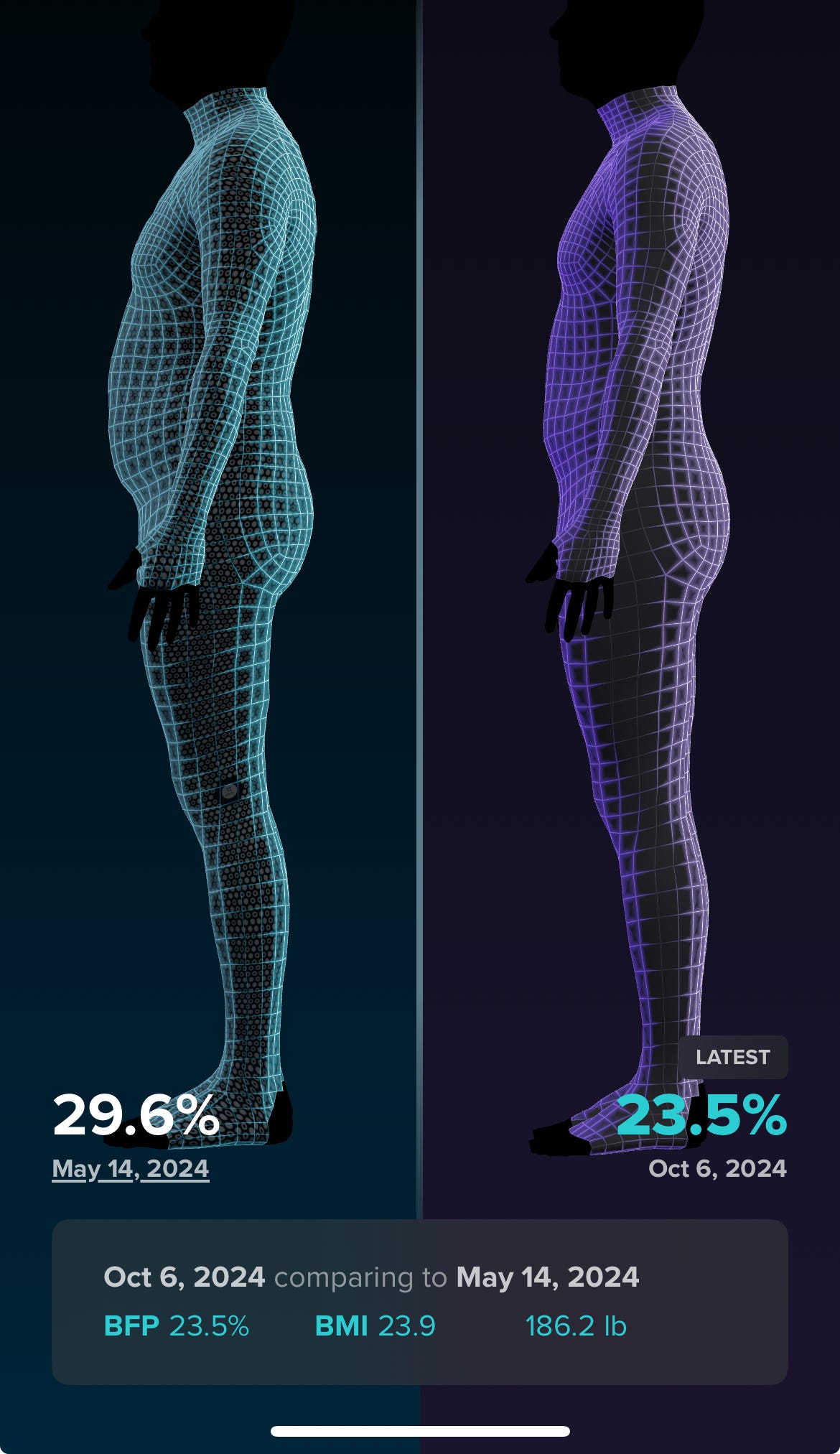
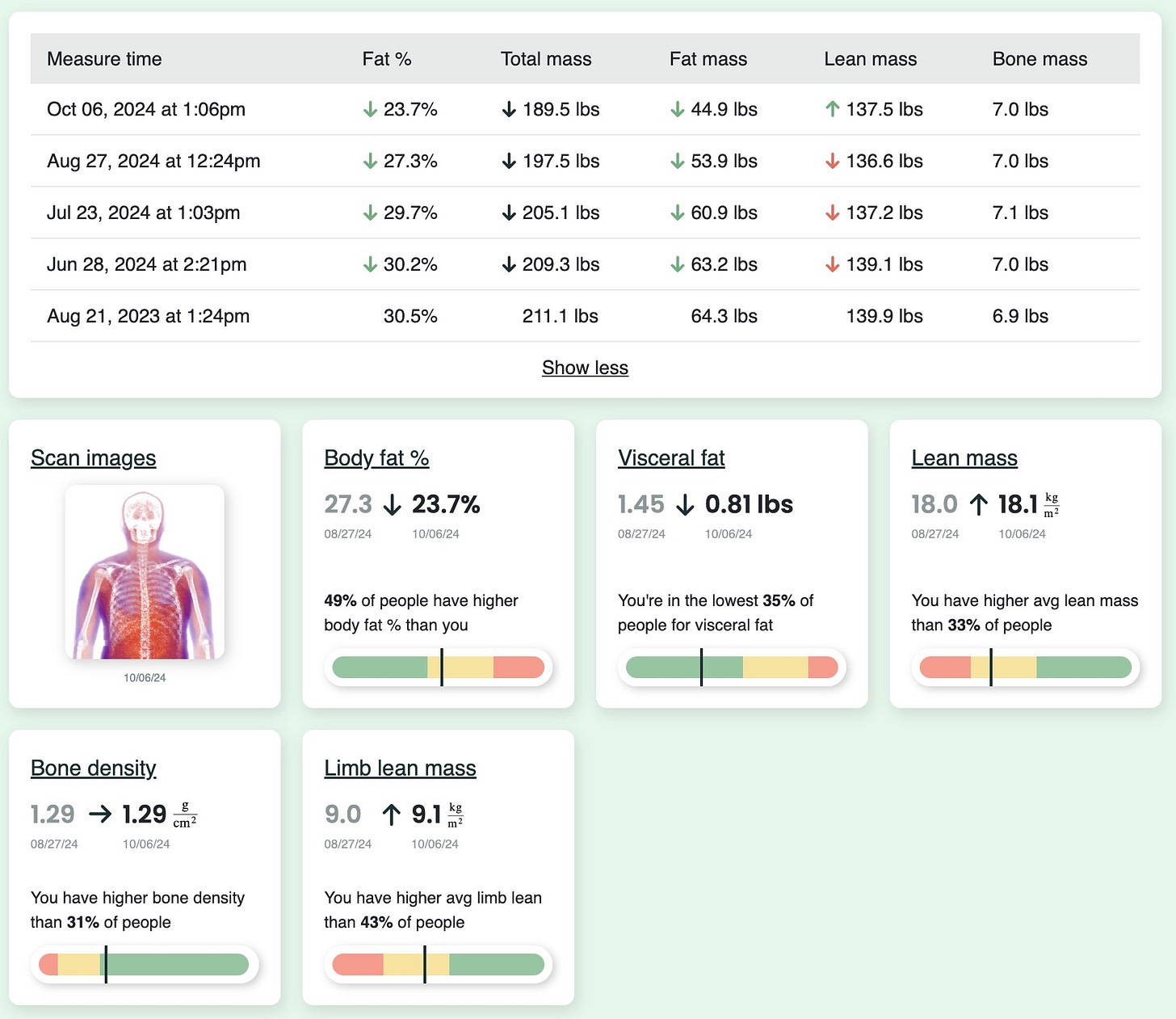


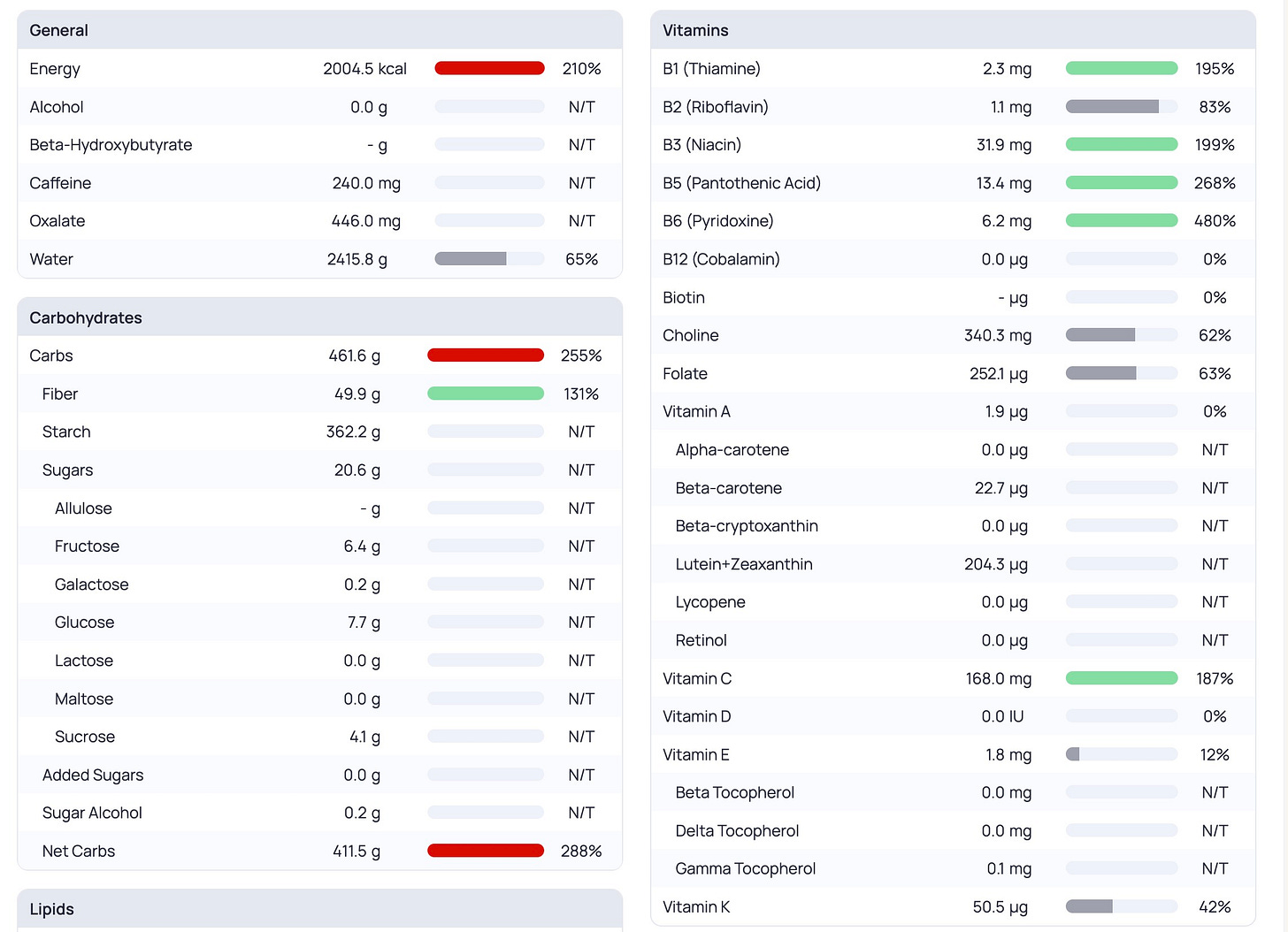

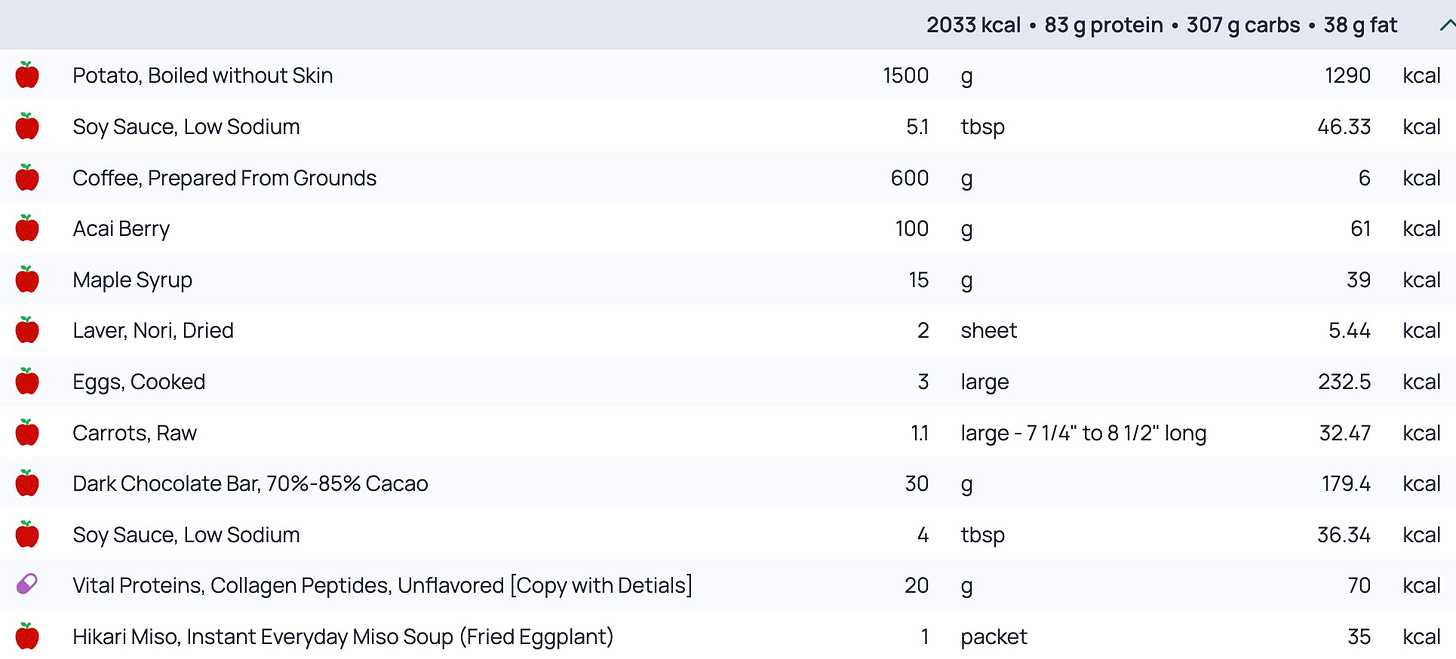
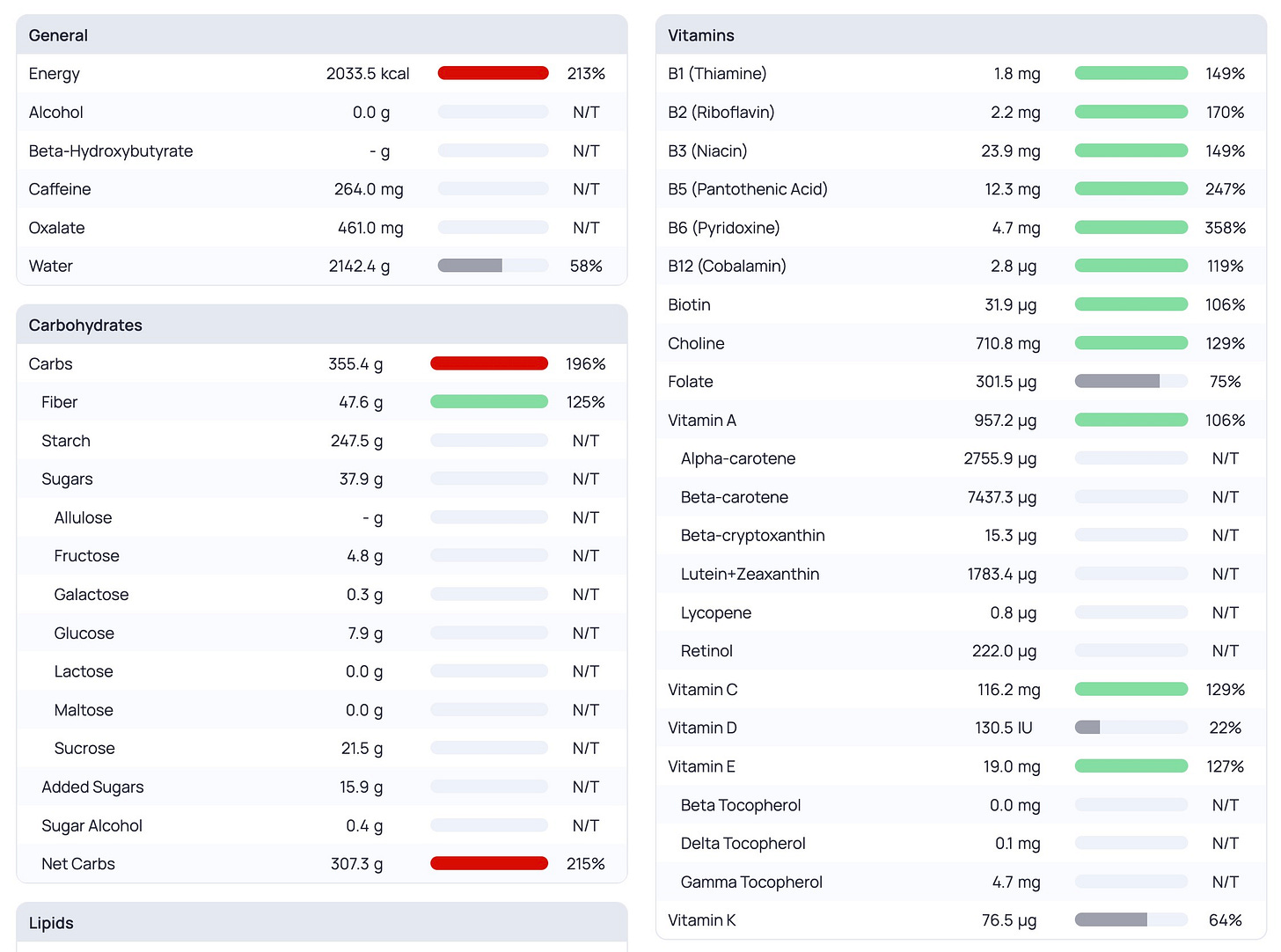
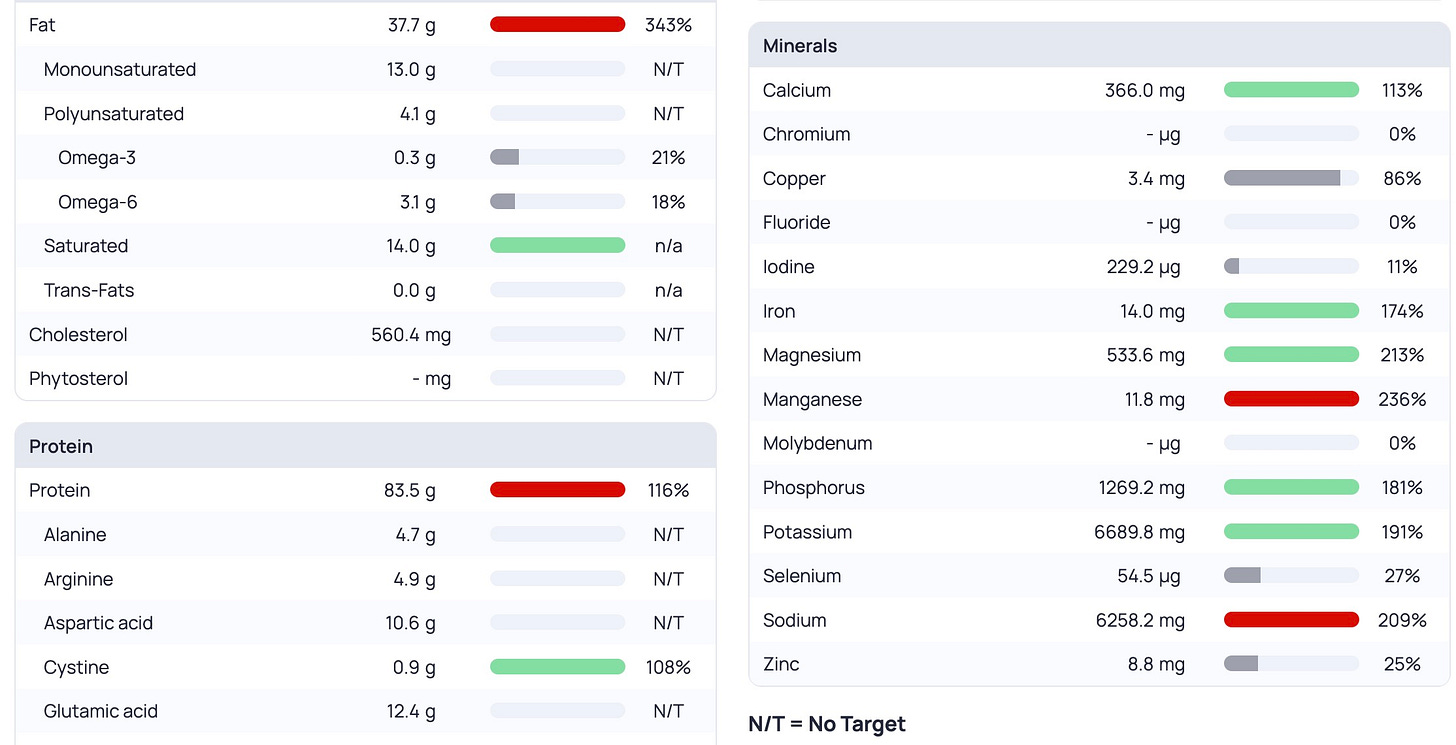
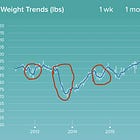

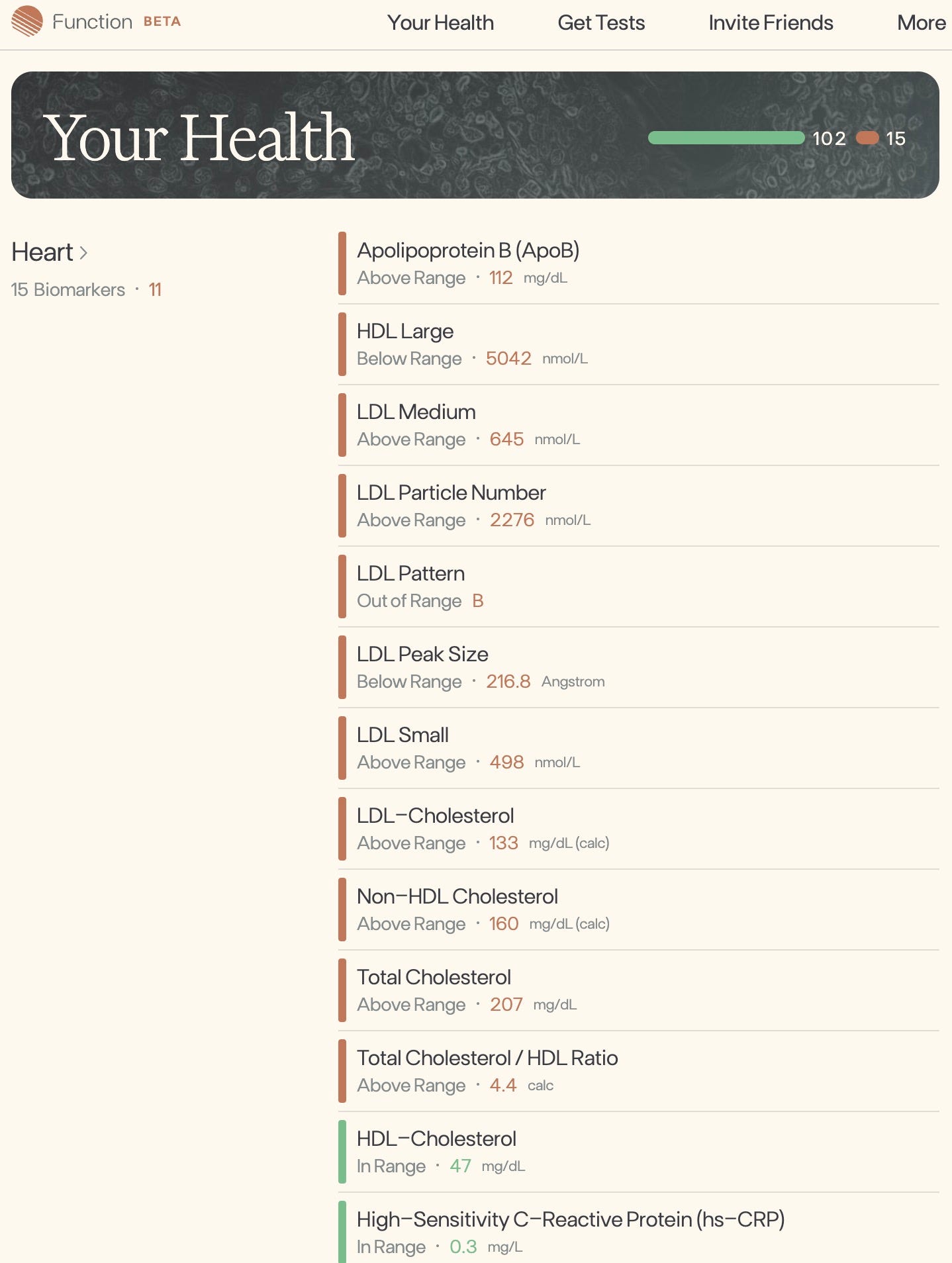

Hey, fabulous! Well done, and good luck with your app. It sounds like exactly the sort of thing that's needed.
Very interesting post. I agree that the starch diet sounds very promising. A lot of people on r/saturatedfat seem to basically be doing ex150starchdiet, with a small amount of beef + mostly starch.
I do wonder how your weight loss curve will go. Mine was pretty much exponential decay with plateaus of various length. I'd be surprised if you could just easily go down to abs, haha. But maybe?